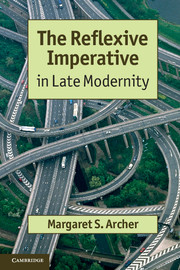Book contents
- Frontmatter
- Contents
- Figures
- Acknowledgements
- Introduction
- 1 A brief history of how reflexivity becomes imperative
- 2 The reflexive imperative versus habits and habitus
- 3 Reconceptualizing socialization as ‘relational reflexivity’
- 4 Communicative reflexivity and its decline
- 5 Autonomous reflexivity: the new spirit of social enterprise
- 6 Meta-reflexives: critics of market and state
- 7 Fractured reflexives: casualties of the reflexive imperative
- 8 Conclusion
- Methodological appendix
- Index
- References
1 - A brief history of how reflexivity becomes imperative
Published online by Cambridge University Press: 05 June 2012
- Frontmatter
- Contents
- Figures
- Acknowledgements
- Introduction
- 1 A brief history of how reflexivity becomes imperative
- 2 The reflexive imperative versus habits and habitus
- 3 Reconceptualizing socialization as ‘relational reflexivity’
- 4 Communicative reflexivity and its decline
- 5 Autonomous reflexivity: the new spirit of social enterprise
- 6 Meta-reflexives: critics of market and state
- 7 Fractured reflexives: casualties of the reflexive imperative
- 8 Conclusion
- Methodological appendix
- Index
- References
Summary
Does reflexivity have a history? It seems that, like language, upon which reflexivity depends – without being entirely linguistic – it must have a pre-history. That is, there must have been a time before which homo erectus or his kinfolk had learned to speak and to be capable of mentally reflecting about their intentionality. In other words, there was a before and an after. What is not obvious is whether or not ‘afterwards’ was a long, continuous and unfinished process of constant elaboration, or if reflexivity's biography consisted of distinct and discontinuous periods. Another way of putting the same question is: does human reflexivity show distinct variations in the modes through which it is practised and, if so, were such modalities subject to change over time in response to changing historical circumstances?
A difficulty arises in posing the question in this way, namely, that it would be acknowledged in some disciplines but not in others. On the one hand, in psycholinguistics and as early as 1934, Vygotsky was calling for a ‘history of reflexivity’. Certainly, his appeal resulted in very little take-up but not, it seems, because his request was unintelligible or unacceptable. It appears more likely that what accounted for the lack of response was the need for considerable historical probing and bold conjecturing at precisely the time when it was safer for his Russian collaborators to confine themselves to laboratory work and to seek political cover behind ‘scientism’. On the other hand, Western social theorists have shared the same reluctance to respond to Vygotsky's call. Instead, their common denominator has been to regard reflexivity as a homogeneous phenomenon. Either people exercised it or they didn't but, when they did they were engaging in much the same kind of practice and for much the same kind of reasons. At most, they could do so more or less, as in what has recently become known as ‘the extended reflexivity thesis’.
- Type
- Chapter
- Information
- The Reflexive Imperative in Late Modernity , pp. 10 - 46Publisher: Cambridge University PressPrint publication year: 2012



